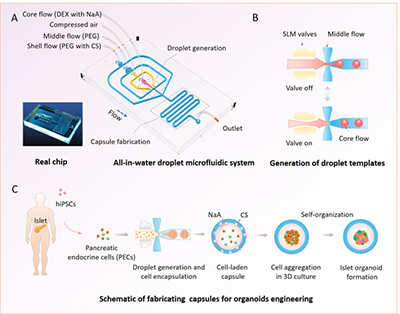Research group led by Prof. QIN Jianhua from the Dalian Institute of Chemical Physics (DICP)of the Chinese Academy of Sciences made a progress on the fabrication of hybrid hydrogel capsules that enables stem cell organoids engineering in a novel droplet microfluidic system. The results were published in Advanced Science.
Recently, there has been a growing interest in building functional 3D organ models in vitro. Organoids are multicellular tissues formed by self-organization of stem cells in 3D culture, representing a new class of organ models that mimic corresponding native organs.
Starting as a major technological breakthrough, they have shown enormous potential in organ developmental studies, disease modeling, drug screening, and translational research.
Generally, organoid derivation protocols mainly rely on self-organization of stem cells in 3D animal-derived matrices (e.g., Matrigel) by tedious operations. However, organoids are often limited by significant variability and low throughput, which is partially due to the complex and poorly defined matrix, as well as the labor-intensive multistep process in the existing approaches.
Advances in biomaterials, especially in hydrogels have offered great opportunities to recreate 3D tissue/organ models with more physiological relevance in a controlled manner. Hydrogels are polymers with high water content, defined compositions and tunable physicochemical properties, which can recapitulate the in vivo microenvironment for the establishment of organ models with higher fidelity.
In addition, droplet microfluidic has attracted much attention in building cellular spheroids due to its inherent advantages of high-throughput and controllability.

Schematic diagram of all-in-water droplet microfluidic system to fabricate hybrid hydrogel capsules that enable 3D culture and generation of islet organoids.
In this research, researchers present a novel strategy for one-step and high-throughput fabrication of hydrogel capsules in a droplet microfluidic system that enables stem cell organoids engineering by combining bioengineering technology, materials and stem cell biology.
The proposed capsules allow for 3D culture, growth, and massive generation of human islet organoids from human induced pluripotent stem cells (hiPSCs) in a continuous process. Herein, a microfluidic chip with pneumatic valves was designed and manipulated for the generation of water-in-water droplets that were utilized as templates for fabrication of binary capsules relying on interfacial complexation of oppositely charged Na-alginate (NaA) and chitosan (CS).
The islet organoids generated within the capsules exhibited great uniformity on their size and morphology due to the controllable generation progress. Also, these organoids displayed great cellular viability and sensitive glucose-stimulated insulin secretion function.
The proposed strategy can not only facilitate the reproducibility of organoids by providing uniform and defined 3D scaffolds, but also be amenable to massive production of organoids.
This system is scalable, easy-to-operate and stable, which could offer a robust platform for various stem cell organoids engineering and advancing their biomedical applications.
This research was supported by the Strategic Priority Research Program of the Chinese Academy of Sciences and National Nature Science Foundation of China. (Text and Image by LIU Haitao, WANG Yaqing)